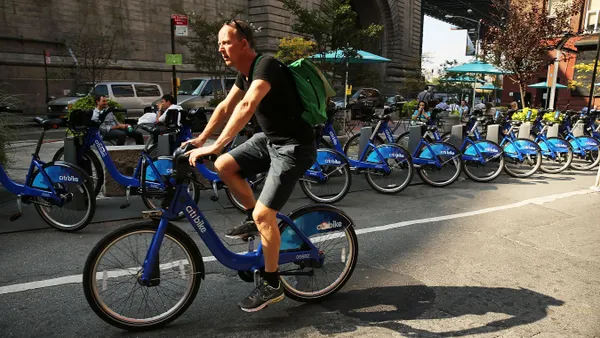Dive Brief:
- Boom Supersonic, a Denver-based startup, has secured $10 million in funding from Japan Airlines to revive the supersonic passenger flight industry, according to Reuters and others. Japan Airlines will assist Boom with developing the aircraft design and the passenger experience.
- The companies say the plane will be 10% faster, its sonic boom will be 30% quieter and it will be 75% cheaper for customers to fly on than the Concorde.
- Boom reports having 76 pre-orders — including from Virgin Atlantic — for the new plane, which it expects to go into service in 2023.
Dive Insight:
Japan Airlines is the first commercial airline to back Boom's work with funding, but in light of the 76 pre-orders, it wouldn't be surprising to see others contribute as well.
Boom boasts the ability to take travelers between New York and London in about three-and-a-half hours compared with the typical seven hours. It also claims to be able to do it at prices comparable to current business class tickets, as opposed to the typical $5,000-10,000 for a Concorde flight. The savings reportedly are due to the new jet's fuel efficiency.
No commercial supersonic flights have flown since the Concorde ended its run in 2003. Part of the reason is that in 1973 the United States banned supersonic jets from flying over land because of sonic booms, and most other countries have done the same. That drastically limits airlines' potential markets and makes the economics of operating those flights difficult.
Many questions still surround sonic booms — such as what effect they have on the infrastructure in modern cities — particularly if they were to start happening frequently if the overland airspace were to reopen to supersonic aircraft. Even if Boom does manage to manufacture a plane that produces sonic booms 30% quieter than the Concorde, it's unclear if repeated vibrations of that type would weaken the integrity of buildings and other structures over time.
If Boom Supersonic finds a way to deliver on its promises of speed and lower costs, it might revolutionize air travel. The cities chosen as hub locations for the aircraft could experience an economic boost, especially from foreign tourism.
Currently the business appears to be focused on product development and finding a place to build its aircraft, instead of studying sonic booms' impact or working to change the overland ban. Overturning the ban would open up supersonic travel to the entire United States instead of just to coastal cities. It could offer more widespread economic gains, both to municipalities and to Boom Supersonic.
Yet, rushing to end the ban without strong evidence that sonic booms do not damage cities' infrastructure could be detrimental. If Boom is investigating the impact of sonic booms and is pursuing a ban overturn, it might benefit from going public and trying to get others on board with those efforts. If its silence is because it's not looking into overturning the ban, Boom should seriously consider its ability to operate solely as a transoceanic carrier.










